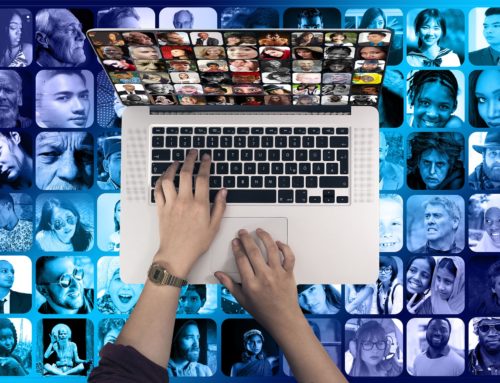 As I was glancing through my Reader last week, I caught an interesting post from my friend Geoff Livingston that posited we’re rapidly approaching the end of the technology adoption curve for social media.”
As I was glancing through my Reader last week, I caught an interesting post from my friend Geoff Livingston that posited we’re rapidly approaching the end of the technology adoption curve for social media.”
Image: ram reddy via Flickr, CC 2.0
I thought about this.
And thought some more.
And thought even more.
A few nights ago
I was at a dinner party with a dear friend I haven’t seen in three years or so (give or take a few months).
The ensemble included some Very Smart People who work for organizations like the World Bank and USAID, as well as Even More Smart People Who Have Been To Cambridge and are now U.S. government contractors.
They couldn’t give two hoots, let alone three, about social media.
Facebook?
“Too many privacy issues.”
“I don’t post my kids’ pictures on there.”
“It was great when we had our [high school] reunion, we were immediately in [20+ years ago].
Twitter?
“So once you apply for Twitter…”
Foursquare?
sitting there, sweet smile (I can smile sweetly, you know) plastered on my face, legs crossed tighter than the Queen, so much so that my undies were in danger of rupturing me a new one.
Image: kris krüg via Flickr, CC 2.0
As the conversation moved to and from social media, the current state of racism in various African nations, the mind-boggling ineptitude of the Indian government, a little voice inside of me kept saying,
“Wow. WOW. They really don’t care about SM.”
This is not to denigrate my friends at all.
As I’ve already said, they are Very Smart People.
Much smarter than I am.
But when we hear of social media adoption rates, how social media will kill PR, and how social campaigns herald the future, we need to stop.
And think.
And realize.
That as much as you and I, who are caught up in the maelstrom of social media, might like to think everyone “gets it,” everyone does not.
So for all the studies and reports that tell us we are past the social media “adoption curve,” I give you…
My friends.
Statistically, probably irrelevant, but anecdotally, extremely so.
These are the people, at the executive level, whom you and I are trying to reach.
These are the people you and I want as clients.
These are the people controlling significant budget dollars that they can put towards social media – if they “get” it – or towards traditional advertising and one-way media relations.
While these people might not be in the 21% of Americans who don’t use the Internet (because they do, for email and catching up with friends on Facebook), they do not see the value of social media and networks as it pertains to the achievement of their business objectives, or what I like to call WIIFM.
So, while social media might have finally escaped the fad phase (and you’ll want to read Dr. Grunig’s paper on this, particularly since it pertains to the practice of public relations in the digital age), I don’t think we’re quite over the adoption phase yet.
What say you?









[…] There are still enough of us who are still setting foot on it, to make our own experiences unique and relevant. […]
[…] opportunity to comment on Facebook as it is today. While Shonali mentioned in an earlier post that some people don’t care about social media, there are others who care about social media, but vehemently think it’s […]
[…] “knowing what something is but not what it does” is exactly what I was getting at with the social media stepchild. And in no way does this imply Ike endorses, likes (or has even read) my post – just seems to […]
[…] was an opinion that adoption was not over. Two bloggers (and several Twitter friends) felt that the general public needs to better understand social media, that because of networked effects social media supersedes traditional media, and that […]
I thought it was “me”, seeing the deer in head light look when sharing the fun I have on Twitter, Linkedin and FaceBook. There is the “huh?” when I say anything with the word “social media” to “didn’t know you can it as a marketing tool” .
There is progress, every time I see my doctor, she is more receptive now to using Twitter, Facebook page to share her expertise and knowledge, grow a following…but it did take a year…
Ana, I think the point you make about SM taking time, is very true. This is one of the reasons I believe it’s still relatively tough for senior execs to come on board with it. They want instant results and are still stuck in old world methodologies.
So no, it’s not just you. It’s all of us. :)
Hi Shonali,
I tend to agree with your point. The last two days, I’ve spoken at two different PR events. The first one was for state-employees charged with improving perceptions of people with disabilities (among other tasks, but that was our focus on that day), and a PRSA event. At both events, I talk to dozens of people who didn’t have a Facebook page — let alone a Twitter account — for themselves or their company, but they knew enough to know that online communication (whether they regard it as social or not) was important to help them achieve their goals. I had a long conversation with one women who has been trying — FOR TWO YEARS!! — to get her organization on Facebook. Her bosses agree that they should be on Facebook, but they’ve spent the last two years mired in HR and legal issues, dealing with concerns about security risks, negative feedback, etc.
That tells me that we have a lot of work to do … and a lot of opportunity as PR people.
Thanks for staring the discussion …
Heather
@prTini
Thanks so much for stopping by, Heather. When I was talking to Steve Crescenzo the other day, he made many of the same points about HR & legal issues, though in the context of strategic creative communications… but I’m pretty sure we’d agree that social media falls into that.
What a terrific post, Shonali. I’ve been saying the same thing to my clients and peers and while they’re often looking at me wondering what kind of crack I’m smoking, it’s encouraging to know that I’m not alone. We are often so immersed in this “space” … the place where so many of our friends are dialed into the online world and knowledgeable about social mediums, that we forget about the rest of them. The people running companies, making decisions, selling stuff — all without the benefit of social media — and who really don’t “get it.”
Augie Ray’s blog post about the latest Forrester report backs up these points of view and if you’ve not read, I recommend it (I’m an Augie stalker – I love his blog and his brain).
I think our focus needs to be to step back and realize that we are pioneers in a new space. We are early adopters, as are the Fords and the Zappos and the Comcasts – and the host of other companies – large and small – who get and are actively using social media.
And we have to keep being patient. And keep teaching. And keep showing people the one thing they really want to know: if we do this, if we allocate resources and people power to this whole mysterious social media thing, how does it help our business. In both financial and non-financial ways.
As business people (and not just passionate so med evangelists), it is incumbent upon us to speak to business leaders in the language they understand – how this impacts the bottom line. What the potential is. How this helps us sell more stuff to more people – which is what EVERYONE wants to do — no matter what business they are in. And it’s also important for those of us immersed in the space to do regular reality checks – and make sure we dont’ get all haughty and disdainful when people don’t immediately “get” the benefits of integrating social media into their marketing efforts. It’s a process. It takes time. It takes education. It takes patience.
What a great post! Thanks so much for sharing.
Shelly
@shellykramer
http://v3im.com
Shelly, thank you! Yes, I too am an Augie stalker, he’s absolutely brilliant.
Your point about speaking to business leaders in the language of business is especially pertinent, IMHO. That’s why I think smart measurement is so important, and one of the reasons I started #measurePR… because we are still, as an industry, stuck in ridiculously antiquated ways of measuring success.
When I present on strategic communication, there are 2 points I always try to make and bolster with examples: first, if we’re not connecting our efforts to business objectives, we are complete idiots. This is where understanding what business KPIs are is so important.
Second, that measurement has has HAS to be part of any communication efforts, and not just the fuzzy “we want more buzz” crap. If we don’t know what we’re aiming for, how on earth will we get there?
Thanks so much for stopping by!
Shonali, I’ve had many of the same experiences. We do get caught up in what we do every day and I don’t think we corporate America is all that close to being past the social media adoption curve.
Agree with Diane and Geoff that social media is just another form of media. But few executives have transitioned to that POV, especially when it comes to how they allocate budget. Furthermore, most execs wouldn’t know where to start when guessing how much to budget for a YouTube video or managing a social network presence (e.g. Facebook).
Made several mistakes earlier in my career trying to evangelize benefits of social media and tell people who don’t use it that they “don’t get it.” That approach got me nowhere. Firmly believe now that it’s all about education. And comparing social media to something they know and understand. Thoughts?
I think your point about not telling people why they “don’t get it” is really smart, Justin, and one of the reasons I thought Narciso’s post today was great – because he used Jimi Hendrix, someone this group of speakers he was presenting to could relate to – to explain SM. I think we can come off as smart-a**es sometimes (myself included) and that doesn’t really help, does it?
Shonali, I didn’t see Geoff’s post or the Twitter conversation, but I have to agree (I think) with Geoff.
If we look at Gartner’s hype cycle, from an outside-in point of view we (i.e. marketering/PR/comms professionals) are in the Trough of Disillusionment (http://www.gartner.com/technology/research/methodologies/hype-cycle.jsp).
Consumers/Customers have always been ahead of organizations when it comes to social media (technology). As Geoff said, they don’t call it ‘social media.’ They just use it. Jason Falls has a great post on this very topic (http://www.socialmediaexplorer.com/2010/09/22/the-difference-between-craigs-list-and-social-media/)
Customers/Consumers are ‘Plateau of Productivity.’ They use these tools as it suits them. Hell, as a consumer I was using forums six years ago to connect with people about brands. The brands just weren’t there.
This is a great conversation to have because organizations are still so very far behind.
Thanks Shonali!
Beth Harte
Serengeti Communications
@bethharte
Beth – “trough of disillusionment” – love it!
What I particularly love about all these comments (thank you Geoff, Diane & all) is that they’re making me think more. So thank you for that!
I’ve had similar conversations with my friends and family. And, I always come back to one key point: if the audiences are there, these people will find a way to “get it.” Seems like Marketing 101 to me. Market to your key audiences in the channel that THEY prefer–not the channel YOU prefer.
@arikhanson
Yup, I completely agree with the Marketing 101 thought, Arik. I wonder if in some of these cases, the end-consumer is not directly impacted by social media, and hence such folks don’t consider it a valuable business investment. However, I think we have enough case studies to show that if not directly, SM can have an indirect impact on reaching influencers, donors, etc., and therefore does need to be taken seriously. The type of conversation I used as an example just goes to show that SM still has a ways to go in reaching their consciousness.
Good post as always Shonali.
I read it and thought about this > Graphic of The Social Media Bubble http://ow.ly/2O2w7
Anyone of us thinks that our life is the “norm”. Of Course we don’t think that when it comes to people living in other places speaking other languages.
We do, however, think that friends of ours, living in the same city, going to the same schools etc… live our version of the world.
Not so.
Shaun Dakin
@IsCool
@ShaunDakin
@EndTheRoboCalls
@PrivacyCamp
Ha, that’s a great graphic, Shaun. Thanks for sharing!
Geoff beat me to the punch about understanding/studying social media vs just using it. The lines are simply blurring between “traditional” and social channels.
It’s a great relief to (maybe) get past the stage where social media is THE topic — where we sit in the echo chamber and bounce theories and pronouncements around endlessly among ourselves. Nobody else cares.
As PR people, we have to understand social media is a tool, not a lifestyle. We have to create a culture of social media in order to do our jobs. We just don’t have to inflict that self-conciousness on our very smart friends. Remember, they probably claim not to watch TV, either.
Diane, I completely agree that it’s refreshing to participate in a conversation that’s not about social media. What’s fascinating to me is that when the conversation does turn there (in this case, the catalyst was someone asking about “The Social Network,” i.e. the movie) it’s still viewed as an anomaly or something “geeky” people do… hence my thinking aloud about whether we’re really over the adoption curve.
Interesting point about SM being a tool and not a lifestyle. Yes, it’s a tool, but I think it’s fast becoming a lifestyle as well, though definitely not a mainstream one yet.
Yes, indeed, a lifestyle for those who (a) make a living at it or (b) make a living *through* it, e.g. blogging to promote your real estate or cosmetic business, along with those with the intent to influence (see “political cause.”) Or those who just want to Be Somebody.
After all, nobody ever made the phone a “lifestyle” unless they were trying to sell something or someone (see above). Then, there was/is value in learning how the tool operates, what is effective, ideal length and content, timing, etc. But we certainly got over the adoption hump there!
[…] This post was mentioned on Twitter by Shashi Bellamkonda, Shonali Burke, Liz Scherer, David Jones, David Jones and others. David Jones said: RT @shonali: New post: The Social Media Stepchild http://t.co/BPC3lgI (where I wonder if we're really over the SM adoption curve as @geo … […]
Lay people do not need to nor do they want understand the finite differences of social and traditional media. I think you’re confusing professional interest with normal people going through their lives. Stats show we are done, people don’t identify Skype chats, comment boxes or YouTube videos as “social media.” They just use them.
First, Geoff, thanks for stopping by and again for a great, thought-provoking post.
As I said during our Twitter convo earlier today, your choice of words is very interesting (e.g. “get” v. “care”). When it comes to these folks specifically, they’re not SM professionals and in that you’re right. But that’s my point precisely. It’s only when the “normal” people start “getting” it that, in my opinion, we can really say we are over the adoption curve. And that’s what I’m wondering about… if these studies are truly representative of the reality that’s out there.
Hi Shonali–great observation and discussion topic. It helps to hear a perspective on SM outside of the PR/Marketing/Communications realm. While those of us in the field are already adapting to the new tools at hand, I agree with your observation that there other business sectors that are still getting familiar with them. It’s a challenge for us to keep educating ourselves so we can in turn educate and consult others on what works best for them and their business models.
Krista – yes, and therein lies the rub, I think. It’s precisely because of this need for ongoing education that I’ve become much more patient with the “how to tweet” posts I still see popping up here and there. Again, while such posts deal with tactical nitty-gritty, at least they’re taking the time to try to educate people who are still wondering about social platforms.
All comes down to perspective and what lenses we see the world from. PR will never go away, it will just evolve and adapt to changing needs.